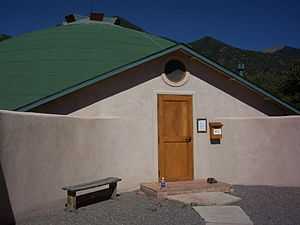Lindisfarne Association

The Lindisfarne Association (1972–2012) was a group of intellectuals of diverse interests organized by cultural historian William Irwin Thompson for the "study and realization of a new planetary culture". It was inspired by the philosophy of Alfred North Whitehead's idea of an integral philosophy of organism, and by Teilhard de Chardin's idea of planetization.[1][2]
In his book Reimagination of the World, Thompson described his reasons for naming his group after Lindisfarne, an island with a famous monastery (once inhabited by Saint Cuthbert) just off the coast of Northumberland in the North East of England:
"Although I used the word as a symbol of a small group of people effecting a transformation from one system to another, the word also brought with it the archetypical associations of a small group of monks holding onto ancient knowledge in a fallen world, a world that would soon overrun them during the Viking terror."[3]
History
In 1972, with funding from Sydney and Jean Lanier, and later from Laurance Rockefeller, Thompson founded the Lindisfarne Association, first in Southampton, New York in 1973 and then to Manhattan to the Church of the Holy Communion and Buildings which was leased to Lindisfarne from 1976–1979. In 1979 its final move was to Crestone, Colorado, where today the Lindisfarne Fellows House, the Lindisfarne Chapel, and the Lindisfarne Mountain Retreat are under the ownership and management of the Crestone Mountain Zen Center.[4] Lindisfarne has functioned variously as a sponsor of classes, conferences, and concerts and public lectures events, and as a think tank and retreat, similar to the Esalen Institute in California. Lindisfarne functioned as a not-for-profit foundation until 2009; the Lindisfarne Fellowship continued to hold annual meetings until 2012. It is no longer an active organization.
Goals
According to the Lindisfarne Association website, Lindisfarne's fourfold goals are:
- The Planetization of the Esoteric
- The realization of the inner harmony of all the great universal religions and the spiritual traditions of the tribal peoples of the world.
- The fostering of a new and healthier balance between nature and culture through the research and development of appropriate technologies, architectural settlements and compassionate economies for meta-industrial villages and convivial cities.
- The illumination of the spiritual foundations of political governance through scholarship and artistic communications that foster a global ecology of consciousness beyond the present ideological systems of warring industrial nation-states, outraged traditional societies, and ravaged lands and seas.
Members
Members of the Lindisfarne Fellowship have included, among others:
|
|
|
Current status
The Lindisfarne Association disbanded as a not-for-profit institution in 2009. The Lindisfarne Fellows continued to meet once a year up to 2012 at varying locations as an informal group interested in one another's creative projects.
References
- ↑
Dr. Thompson served as the founding director of the wellknown Lindisfarne Association, which his biographical blurb describes as a contemplative education community devoted to the study and realization of a new planetary culture.
NYT review of THE TIME FALLING BODIES TAKE TO LIGHT. Mythology, Sexuality, and the Origins of Culture by Christopher Lehmann-Haupt - ↑ Lindisfarne's original incorporation statement from 1972
- ↑ p5
- ↑ "The Lindisfarne Tapes". Schumacher Center for a New Economics. Retrieved 5 May 2014.
See William Irwin Thompson, "Afterword" to DARKNESS AND SCATTERED LIGHT (New York: Doubleday, 1978), 181-183.
External links
- Lindisfarne Association website at WilliamIrwinThompson.org; Internet Archived version)
- 2007 Symposium Notes from the Wild River Review